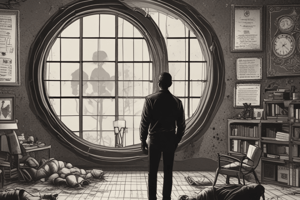Podcast
Questions and Answers
What is the primary focus of criminal psychology?
What is the primary focus of criminal psychology?
- The development of criminal profiling techniques
- The study of criminals, their behavior, and the psychological aspects of crime (correct)
- The treatment and rehabilitation of mentally ill offenders
- The study of crime scenes and evidence
Which theory suggests that criminal behavior is a result of rational choice and free will?
Which theory suggests that criminal behavior is a result of rational choice and free will?
- Social Learning Theory
- Positivist Theory
- Trait Theory
- Classical Theory (correct)
What is the primary goal of criminal profiling?
What is the primary goal of criminal profiling?
- To identify the offender and predict their future behavior (correct)
- To determine the motivations behind a crime
- To analyze the crime scene evidence
- To treat and rehabilitate offenders
Which type of criminal is characterized by a lack of empathy and impulsivity?
Which type of criminal is characterized by a lack of empathy and impulsivity?
What is the focus of cognitive-behavioral therapy in treating offenders?
What is the focus of cognitive-behavioral therapy in treating offenders?
What is the application of criminal psychology that focuses on the rehabilitation and treatment of offenders in correctional facilities?
What is the application of criminal psychology that focuses on the rehabilitation and treatment of offenders in correctional facilities?
Flashcards
Criminal Psychology
Criminal Psychology
The study of criminals and the psychological aspects of crime.
Classical Theory
Classical Theory
Views criminal behavior as a result of rational choice and free will.
Psychopaths
Psychopaths
Individuals who lack empathy, impulsivity, and have shallow emotions.
Cognitive-Behavioral Therapy
Cognitive-Behavioral Therapy
Signup and view all the flashcards
Criminal Profiling
Criminal Profiling
Signup and view all the flashcards
Social Learning Theory
Social Learning Theory
Signup and view all the flashcards
Study Notes
Criminal Psychology Overview
- Branch of psychology that focuses on the study of criminals, their behavior, and the psychological aspects of crime
- Also known as criminological psychology or forensic psychology
- Aims to understand the thoughts, feelings, and behaviors of criminals to prevent and investigate crimes
Theories of Criminal Behavior
- Classical Theory: Criminal behavior is a result of rational choice and free will
- Positivist Theory: Criminal behavior is a result of internal and external factors, such as poverty, education, and upbringing
- Trait Theory: Criminal behavior is a result of inherent personality traits, such as impulsivity and lack of empathy
- Social Learning Theory: Criminal behavior is learned through observation and reinforcement
Types of Criminals
- Psychopaths: Lack empathy, impulsivity, and shallow emotions
- Sociopaths: Lack empathy, but may exhibit emotional responses
- Dissocial Personality Disorder: Lack empathy, impulsivity, and may exhibit aggressive behavior
- Mentally Ill Offenders: Commit crimes due to a mental health disorder, such as schizophrenia
Criminal Profiling
- Process of analyzing crime scene evidence to create a profile of the offender
- Uses psychological theories and crime scene investigation to understand the offender's behavior and motivations
- Aims to identify the offender and predict their future behavior
Treatment and Rehabilitation
- Cognitive-Behavioral Therapy: Focuses on changing the offender's thought patterns and behaviors
- Behavioral Modification: Uses positive reinforcement to change behavior
- Psychoanalytic Therapy: Explores the offender's unconscious motivations and past experiences
Applications of Criminal Psychology
- Forensic Psychology: Applies psychological principles to the justice system, including assessment, treatment, and consultation
- Criminal Investigation: Uses psychological principles to investigate crimes and profile offenders
- Correctional Psychology: Focuses on the rehabilitation and treatment of offenders in correctional facilities
Criminal Psychology Overview
- Branch of psychology that studies criminals, their behavior, and psychological aspects of crime
- Also known as criminological psychology or forensic psychology
- Aims to understand thoughts, feelings, and behaviors of criminals to prevent and investigate crimes
Theories of Criminal Behavior
Classical Theory
- Criminal behavior is a result of rational choice and free will
- No role of external factors, focuses on individual responsibility
Positivist Theory
- Criminal behavior is a result of internal and external factors
- Factors include poverty, education, and upbringing
- Focuses on individual and environmental factors
Trait Theory
- Criminal behavior is a result of inherent personality traits
- Traits include impulsivity, lack of empathy, and aggression
Social Learning Theory
- Criminal behavior is learned through observation and reinforcement
- People learn by observing and imitating others
Types of Criminals
Psychopaths
- Lack empathy, impulsivity, and shallow emotions
- Characterized by superficial charm and manipulation
Sociopaths
- Lack empathy, but may exhibit emotional responses
- May have a sense of right and wrong, but disregard it
Dissocial Personality Disorder
- Lack empathy, impulsivity, and may exhibit aggressive behavior
- May have a disregard for others' feelings and safety
Mentally Ill Offenders
- Commit crimes due to a mental health disorder
- Examples of disorders include schizophrenia, bipolar disorder
Criminal Profiling
- Process of analyzing crime scene evidence to create a profile of the offender
- Uses psychological theories and crime scene investigation to understand behavior and motivations
- Aims to identify the offender and predict their future behavior
Treatment and Rehabilitation
Cognitive-Behavioral Therapy
- Focuses on changing the offender's thought patterns and behaviors
- Aims to identify and change negative thought patterns
Behavioral Modification
- Uses positive reinforcement to change behavior
- Focuses on modifying behavior through rewards and punishments
Psychoanalytic Therapy
- Explores the offender's unconscious motivations and past experiences
- Aims to understand the underlying causes of behavior
Applications of Criminal Psychology
Forensic Psychology
- Applies psychological principles to the justice system
- Includes assessment, treatment, and consultation
Criminal Investigation
- Uses psychological principles to investigate crimes and profile offenders
- Aims to understand the offender's behavior and motivations
Correctional Psychology
- Focuses on the rehabilitation and treatment of offenders in correctional facilities
- Aims to reduce recidivism and improve mental health
Studying That Suits You
Use AI to generate personalized quizzes and flashcards to suit your learning preferences.




